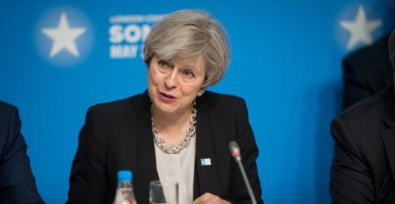As Theresa May bids farewell to politics, her legacy is one of controversy, particularly within migrant communities and advocacy circles.
As Prime Minister May passed the Modern Slavery Act in 2015, hailed at the time as a crowning achievement that offered “world-leading protections” for trafficking survivors. May has also been at the front and center of the criticism launched at her own party’s leadership for immigration policies that will essentially abandon trafficking victims.
At the same time, as home secretary, May is the person who introduced changes to the rules governing the Overseas Domestic Worker (ODW) visa in 2012, severely limiting workers’ ability to escape exploitative situations – a situation which persists to this day.
May’s forced labor legacy
Previously, workers could switch employers and eventually settle in the U.K., but after her regulations were implemented, workers were then tied to their initial employers, leaving many vulnerable to abuse.
Francesca Humi who has supported migrant domestic workers in the U.K. shares,
Combined, these rule changes made it very difficult for employees to escape abuse without being threatened with removal if they overstayed their visa. Few employers will hire a domestic worker midway through a six-month visa, as they have to register these changes with the Home Office to sponsor the worker, which is too complicated for most employers, especially for such a short period of time. But domestic workers cannot be without an employer and remain legally in the UK.
This is what it means to be tied, and the result has been that migrant domestic workers can’t escape the exploitation and abuse because they cannot afford the consequences of protecting themselves, or might not know what options for protection they have.
The implementation of May’s policies coincided with a stark rise in reported cases of exploitation among migrant domestic workers. Prior to 2012, instances of psychological abuse and the denial of days off were already distressingly high at 54%, according to Kalayaan, a charity specializing in migrant worker support. However, post-2012, these figures skyrocketed, with 74% of workers reporting psychological abuse and a staggering 100% deprived of any respite, according to data collected by the same organization in 2013.
The fight continues
May’s reforms extended beyond the realm of domestic work, perpetuating exploitation in other sectors with short-term work visas, such as agriculture and healthcare. According to Humi, migrant workers “are treated like disposable commodities”, stripped of their rights, and subjected to deplorable working conditions.
Her policies set a precedent for subsequent legislation, including the Safety of Rwanda Bill which May has criticized for being “a slap in the face” and “another weapon to hold people in slavery and exploitation.”
May’s departure from politics does not absolve her of the harm caused by her policies. Her legacy remains marred by her failure to safeguard the rights and dignity of migrant workers.
Freedom United stands in unconditional solidarity with migrants and has been campaigning for years alongside domestic workers in the U.K. urging for the restoration of migrant domestic workers’ rights. Join the campaign today and let’s keep pushing the government to do the right thing.







Freedom United is interested in hearing from our community and welcomes relevant, informed comments, advice, and insights that advance the conversation around our campaigns and advocacy. We value inclusivity and respect within our community. To be approved, your comments should be civil.